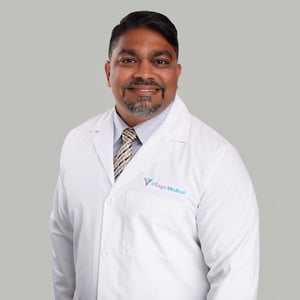3 Tips for Living with Congestive Heart Failure from a Primary Care Physician
While congestive heart failure is a serious condition, I work with my patients on healthy habits that can help them live an active, comfortable lifestyle.
1. There are healthier choices you can build on every day.
Many lifestyle factors put people at a higher risk of experiencing heart failure. While my ultimate goal as a physician is to help patients prevent heart failure, there are important steps those diagnosed with the disease can take to help their condition. For example, you can work with a health care physician or advanced practice provider* to find out what foods work best for you. I typically recommend a diet that is low in saturated fat, rich in fruits and vegetables, low in salt, high in dietary calcium, and rich in fiber. Also, with regular exercise you can improve your health and keep your heart strong.
As a primary care provider (PCP), I know there is no one-size-fits-all approach to achieving these goals. For example, when I work with patients that are always on the road as truck drivers or first responders, we talk about ways to make healthier eating choices when they feel like the only option they have is going through a drive-thru.
2. Take your prescribed medications consistently.
When you have been diagnosed with congestive heart failure, the medications you’re prescribed can be truly lifesaving. There are medications that help the pump function of the heart, help the heart relax, prevent blood clots, and reduce inflammation in the blood vessels. All of these can be helpful in preventing progression and in improving outcomes, but they can only work to the best of their ability when taken correctly, consistently, and with other medications that don’t interfere with their goals.
Through Village Medical’s partnership with Walgreens, I am able to work with pharmacists using the same electronic health records system – meaning we can collaborate daily to make sure my patients are on a medication plan that works for them.
3. Make regular appointments to visit your primary care provider.
When congestive heart failure reaches advanced stages, a specialist is often brought in to give a comprehensive look at a patient’s cardiovascular health. It is still crucial for patients to continue to regularly see a PCP, no matter how many specialists they see, to have a medical professional on their team that is coordinating all aspects of their care.
PCPs take a holistic approach when caring for their patients. It’s not unusual for me to treat a congestive heart failure patient who struggles with medication adherence and lifestyle changes. After taking a deeper look, I sometimes realize patients are going through other struggles, like depression. A specialist may not be asking the questions that lead to a patient opening up about their mental health, but in my role, I am able to take a deeper dive into all the factors that impact my patient’s health. Additionally, while specialists can provide additional insight into specific conditions, we still need to manage the other aspects of your health such as vaccinations, cancer screenings, obesity management, and reducing high-risk behavior.
